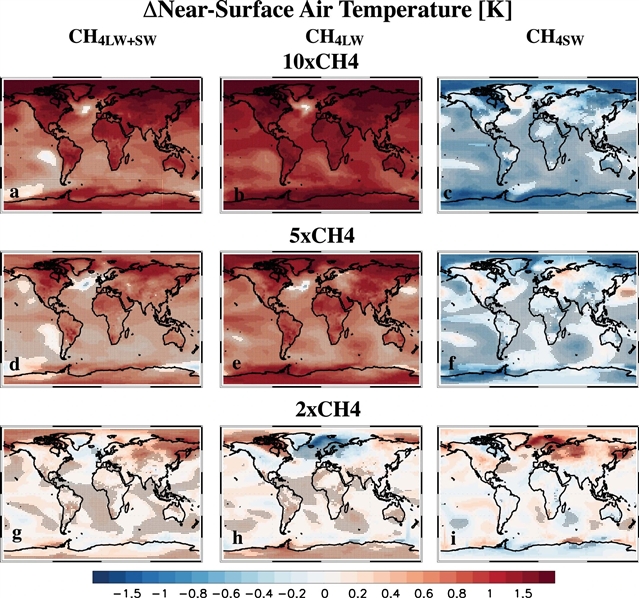
美国加州大学Allen, Robert J.研究团队报道,甲烷的长波辐射效应被短波吸收,导致地表变暖和变湿。相关论文2023年3月16日发表在国际顶尖学术期刊《自然—地球科学》上。
研究团队使用一个模型以及单独的有或没有甲烷短波吸收的模拟进行了系统明确的分析。研究团队发现甲烷短波吸收抵消了约30%与其长波辐射效应相关的地表变暖。对降水的影响甚至更大,因为甲烷短波吸收抵消了降水增加相对于其长波辐射效应的60%。甲烷短波引起的冷却主要是由于云的快速调整,包括低层云的增加,增强了对入射短波辐射的反射,以及高层云的减少,增强了向外的长波辐射。反过来,云的响应与大气太阳加热的廓线以及相应的温度和相对湿度的变化有关。尽管有了这些发现,甲烷仍然是全球变暖的有力因素,减少甲烷排放的努力对于将全球变暖控制在比工业化前的数值高2°C以下至关重要。
据介绍,虽然绿色温室气体主要吸收长波辐射,但它们也吸收短波辐射。最近的研究强调了甲烷短波吸收的重要性,这种吸收使平流层调整的辐射强度提高约15%。然而,相应的气候影响被间接评估,而且在很大程度上仍未被量化。
附:英文原文
Title: Surface warming and wetting due to methane’s long-wave radiative effects muted by short-wave absorption
Author: Allen, Robert J., Zhao, Xueying, Randles, Cynthia A., Kramer, Ryan J., Samset, Bjrn H., Smith, Christopher J.
Issue&Volume: 2023-03-16
Abstract: Although greenhouse gases absorb primarily long-wave radiation, they also absorb short-wave radiation. Recent studies have highlighted the importance of methane short-wave absorption, which enhances its stratospherically adjusted radiative forcing by up to~15%. The corresponding climate impacts, however, have been only indirectly evaluated and thus remain largely unquantified. Here we present a systematic, unambiguous analysis using one model and separate simulations with and without methane short-wave absorption. We find that methane short-wave absorption counteracts ~30% of the surface warming associated with its long-wave radiative effects. An even larger impact occurs for precipitation as methane short-wave absorption offsets ~60% of the precipitation increase relative to its long-wave radiative effects. The methane short-wave-induced cooling is due largely to cloud rapid adjustments, including increased low-level clouds, which enhance the reflection of incoming short-wave radiation, and decreased high-level clouds, which enhance outgoing long-wave radiation. The cloud responses, in turn, are related to the profile of atmospheric solar heating and corresponding changes in temperature and relative humidity. Despite our findings, methane remains a potent contributor to global warming, and efforts to reduce methane emissions are vital for keeping global warming well below 2°C above preindustrial values.
DOI: 10.1038/s41561-023-01144-z
Source: https://www.nature.com/articles/s41561-023-01144-z
